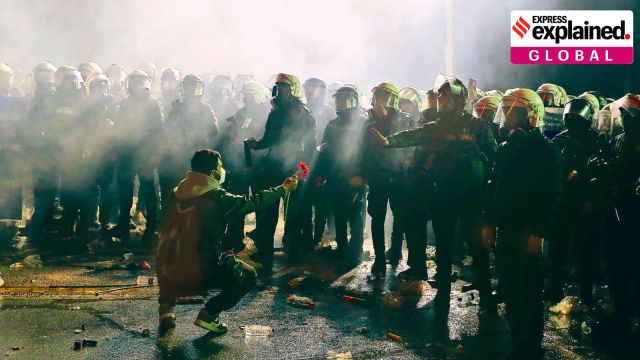© The Indian Express Pvt Ltd
Latest Comment
Post Comment
Read Comments
 A protester gives a flower to riot police officers during a protest in Istanbul on March 23. (Photo: Associated Press)
A protester gives a flower to riot police officers during a protest in Istanbul on March 23. (Photo: Associated Press)On March 19, street demonstrations on a scale not seen in a decade broke out across Turkey after Ekrem Imamoglu, the three-time Mayor of Istanbul, was arrested.
That same day, Turkey’s opposition Republican People’s Party (CHP) declared Imamoglu as its candidate for the 2028 presidential election, after a party-wide primary vote that the Mayor won decisively.
Imamoglu, the most prominent political rival of President Recep Tayyip Erdogan, has been arrested on charges of “bribery, fraud, organised crime, and terrorism” according to Turkey’s state-run Anadolu Agency, and his mayorship of the country’s largest city has been terminated.
Imamoglu has long been seen as a potential alternative to Erdogan, whose Justice & Development Party (AKP) has ruled Turkey since 2002. The protests against Imamoglu’s arrest have refused to die down. On Thursday, Turkey’s Interior Minister said almost 1,900 protesters had been detained over the previous eight days, and 260 of them had been jailed by the courts.
Why has Erdogan’s government gone after Imamoglu at this moment?
Erdogan first took power as Prime Minister in 2003, at the head of the nascent AKP, a party born out of the three-decades-long ideological struggle of conservative Islamist political actors against a secular Kemalist elite establishment.
REINING IN THE MILITARY: Soon after coming to power, Erdogan took a political gamble to curtail the power of the military, which was the spearhead of Turkey’s entrenched secular establishment. To signal the AKP’s preference for a pro-Western “conservative democratic” position instead of Islamism, he chose a pro-EU agenda as his policy priority. Membership of the European Union, however, necessitated a diminution of the military’s role in Turkish politics.
He also embarked on a “zero-problems-with-neighbours” policy, which undermined the Turkish military’s oversized role in the country’s politics. This foreign policy motto guided Turkey’s wooing of the Assads of Damascus, despite their strong anti-Islamist and anti-Muslim Brotherhood reputation.
By 2011, after his pro-reform agenda had enabled the defeat of the military and establishment of an effective monopoly on power, Erdogan was ready to transition to a populist Islamist brand of politics.
As the Arab Spring swept through the region and Arab regimes fell around it (giving way, in some cases like Egypt, to Muslim Brotherhood-backed regimes), Turkey threw its weight behind the anti-Assad opposition in Syria. By 2016, Erdogan’s rampant use of Islamism in policy pushed sections of the Turkish Army to attempt an armed coup d’état — the failure of which allowed Erdogan to further monopolise power.
SUBVERTING THE JUDICIARY: Since the failed coup attempt, Erdogan has also made concerted efforts to attack and weaken the judiciary — with significant success.
Between 2016 and 2019, around 4,000 judges were purged. In 2019, the dramatic trial of the Kurdish women politicians Gultan Kisanak and Sebahat Tuncel saw 16 judges rotated in three-member panels for twelve sessions, making a sustained defence impossible. Kisanak and Tuncel were declared terrorists and jailed; they were released in May last year.
A Reuters investigation in 2020 had laid bare the Turkish judiciary’s willingness to toe the government’s line; five years later, the judiciary this month actively enabled the state to arrest Imamoglu.
In the 1970s, Turkey’s then secular judiciary had pursued and eventually disqualified the country’s first openly Islamist party — the National Order Party, founded by Necmettin Erbakan, one of Erdogan’s most prominent mentors — and its three successor parties. The jailing of Erdogan’s biggest rival indicates the judiciary’s coming full circle in the service of political power.
Real and perceived threats from the Kurdish Workers Party (PKK) have long guided Turkish policy abroad, and helped Erdogan’s authoritarian project.
The Turkish government has blamed the group, which is active in Kurdish-dominated areas of Iraq, Syria, and Turkey, for several terrorist attacks in the country — amping up its rhetoric to the extent that American and Arab support for Kurdish militias such as the Syrian Democratic Forces (SDF) against the Assad regime jeopardised Turkey’s relations with these countries.
Once Assad had established dominance over Syria with Russian help by late 2019, Erdogan bargained with both Moscow and Damascus to prevent full-scale offensives against Islamist opposition groups in Idlib and Turkish-controlled Northern Syria, whom Ankara viewed as a buffer against SDF fighters. The scale of support that Turkey provided to Idlib-based groups such as the Syrian National Army and Hayat Tahrir al-Shaam became clear in December 2024 when these groups drove Assad from power and out of Syria.
The fruits of Turkey’s victory in Syria have since been sweetened by the Trump administration’s lack of interest in reining in Erdogan’s authoritarianism, and focus on reducing support to the Syrian Kurdish SDF.
Efforts to protect democracy in Turkey are no longer on top of the agenda in Europe either. As the EU grapples with the dramatic American volte face in Ukraine and the security ramifications of the undermining of the transatlantic alliance, Ankara’s stock has risen.
The changed situation in Turkey’s neighbourhood has opened up room for Erdogan to make an attempt to dismantle his domestic opposition three years ahead of elections. He would be hoping for the economy to bounce back in the interim, and for pro-Imamoglu sentiments to dissipate. He would draw confidence from the fact that he survived the far bigger Gezi Park protests of 2013 (with over 3 million participants) at a time when the Turkish economy was slowing.
Bashir Ali Abbas is a Senior Research Associate at the Council for Strategic and Defense Research, New Delhi